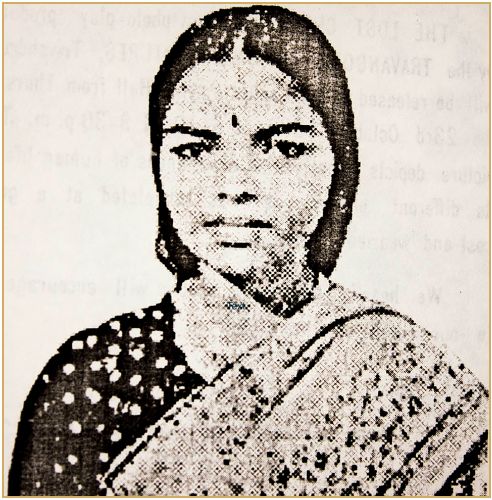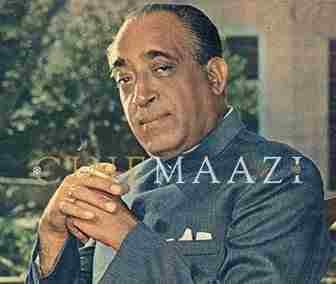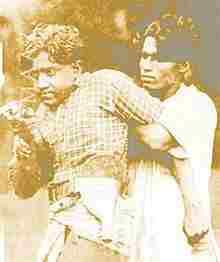P K Rosy

Subscribe to read full article
This section is for paid subscribers only. Our subscription is only $37/- for one full year.
You get unlimited access to all paid section and features on the website with this subscription.
Not ready for a full subscription?
You can access this article for $2 , and have it saved to your account for one year.
- Real Name: Rosamma
- Born: 1903 (Thiruvananthapuram, Kerala)
- Died: 1988
- Primary Cinema: Malayalam
- Parents: Kunji and Paulose
- Spouse: Kesavan Pillai
Celebrated as the first-ever lead actress of Malayalam cinema, P K Rosy is a trailblazer and an important figure in Indian cinema. She acted in J C Daniel’s Vigathakumaran (1928) at a time when women were not allowed in films due to social conventions and attitudes. Defying gender norms by acting in a film, her playing the role of a Nair woman while being of low caste herself drew the censure of upper castes. Belonging to the community of Dalit Christians, she had to face many obstacles in her life and was eventually forced out of the film industry and the state itself. She has not received, in full measure, the respect and recognition she deserves. In February 2023, Google honoured her via a special doodle on the occasion of her birth anniversary. The tech-giant said, “Today’s doodle honours P K Rosy, who became the first female lead in Malayalam cinema. In an era when performing arts was discouraged in many sections of society, especially for women, Rosy broke barriers with her role in the Malayalam film Vigathakumaran (The Lost Child). Though she never received recognition for her work during her lifetime, Rosy’s story is relevant to conversations about representation in the media. Today, her story serves as motivation and inspiration for many.” She also acted in many Kakkarissi plays, a kind of folk theatre in Kerala that blends Tamil and Malayalam in a musical drama format.
In 1903, Rosy was born Rajamma in Thiruvananthapuram, formerly Trivandrum in Kerala, to parents Paulose and Kunji. As Kunal Ray, a cultural critic associated with LAME University, Pune, wrote in his review of The Lost Heroine by author Vinu Abraham based on the actress, her parents were daily wagers. Her father’s sudden death pushed the family into utter poverty. Struggling to make ends meet, Rosy worked as a grass-cutter in her early years to earn a livelihood. Noticing her deep interest in the performing arts, her uncle found her a teacher for music and acting. She also learned classical forms of dance and Tamil folk theatre. She also regularly attended the local school of performing arts to study Kakkarissi Natakam.
According to some sources, after converting to Christianity, she changed her name from Rajamma to Rosamma, then the short form Rosy. Others say that actor-filmmaker J C Daniel changed her name to Rosy, a more glamorous choice. Her mother, however, reportedly remained a Hindu all her life.
When Daniel needed a heroine for his film Vigathakumaran (The Lost Child, 1928), no woman from Kerala was prepared to act in films at the time as the profession was considered unsuitable for women. Hence, he initially brought actress Ms Lana from Bombay to act in the female lead role. He even shot a bit of the film with her; however, when he wasn't able to meet her requirements, she went back.
At this point, Rosy stepped up. She would make her film acting debut in Daniel’s film, playing the role of Sarojini, a woman from the Nair upper caste of Kerala. However, this act drew immense flak, as in those days acting was equated with prostitution. Even those who acted in theatre were looked down upon.
Anticipating the trouble that would come their way, Rosy was reportedly not invited by Daniel for the screening of the film at Capitol Cinema. Many prominent personalities had even threatened to boycott the event if she was present, including well-known lawyer Malloor Govinda, who was given the honour of inaugurating it. Keen to attend the screening, even though she had supposedly been unaware that it would be screened publicly at the time of the shooting, Rosy could only watch the second show of the film.
Sections of the audience vociferously protested inside the cinema hall as a scene in the film picturised the hero kissing the flower in her hair. Some even threw stones at the screen. Additionally, the Nair community later protested against her for playing a Nair woman despite being a Dalit. After the film’s release, Rosy’s home was reportedly set on fire by certain members of the upper castes. Both she and the film faced a barrage of criticism from several Hindu orthodox groups. She was not the only one to bear the brunt: due to the resistance, her director and co-actor Daniel was driven to bankruptcy. No copy of her film Vigathakumaran can be traced.
As a result of the backlash, she had to flee the state. Headed to Tamil Nadu in a truck, she would go on to marry and live the rest of her life with the truck driver, Kesavan Pillai, in Tamil Nadu. A progressive man, Pillai did not discriminate against Rosy's family and also often suggested she visit Kerala – she never did. She and her husband apparently did not reveal her past stardom to anyone. Her children, while aware of some details, were also later reluctant to acknowledge their mother's story because they lived as Nairs, their father's caste.
Rosy’s story lay buried for around four decades till Chelangatt Gopalakrishnan's first article about Vigathakumaran and its tragic fate was published in the late 1960s. Kunnukuzhi, who traced J C Daniel to Nagercoil, published his first article on Rosy in 1971 in Kalapremi. In a video titled ‘PK Rosy's daughter Padma: 100 years of Indian cinema’ which was published by Asianet News on YouTube in 2013, the team tracked Rosy's daughter to Goripalayam, Madurai, and spoke to the family about their forgotten relative. In 2013, a film was made on the life of actor-filmmaker Daniel and his attempt to make the first Malayalam film, in which Chandni Geetha portrayed Rosy. Directed by Kamal, the film won seven Kerala state awards, including for Best Film and Best Actor (Prithviraj). However, Dalit intellectuals felt the film failed to give Rosy her due. It is felt that the cinema field till date is dominated by the upper castes and consequently, the lower castes are under-represented and often fail to get their due.
In 2013, the first PK Rosy Memorial Lecture was organised at Jamia Millia Islamia University, Delhi. Rosy's legacy continues to be kept alive by the Dalit community, among whom she is regarded as a trailblazer. An award in her name was also instituted by the PK Rosy Smaraka Samithi, awarded to women actors in theatre, TV and cinema.
In an effort to restore her name in the annals of history, the Women in Cinema Collective (WCC) of the Malayalam film industry announced the launch a film society named after Rosy. In a statement, the WCC said, “This act of naming our film society a PK Rosy Film Society is a humble attempt to be sensitive and to take note of all those who have been excluded from dominant cinema histories through their gender, caste, religious or class locations and our own imagination, and have been brought to light by many scholars, historians and activists.”









.jpg)



